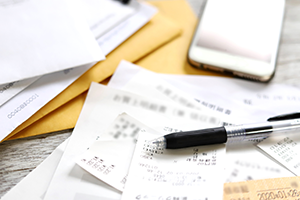If you are concerned about protecting your valuables, here are several suggestions to consider for protecting them from would-be thieves:
- Rent a safe deposit box. It may make sense to keep seldom worn jewelry, coins and other important documents in a traditional safe deposit box at your local bank. But beware if you go this route, as it is often inconvenient to retrieve your valuables, it is easy to forget what is in the box and who has the key. Plus, it’s important to fully understand your rights under the contract terms.
- Install a home safe. There are several types of in-home safes you can choose from, including wall, floor, free standing, fire and gun safes. There are also diversion safes for small items that are designed to look like everyday household objects that can blend in with its surroundings.
 Secure your house. In addition to installing a state-of-the-art home security system, there are several other ways to physically secure your home. Consider updating your locks every several years, and remember to actually use them! Many burglars are looking for easy targets, and unlocked doors and windows provide easy access. Also consider reinforcing your doors and windows, and installing motion-sensing lights both inside and outside.
Secure your house. In addition to installing a state-of-the-art home security system, there are several other ways to physically secure your home. Consider updating your locks every several years, and remember to actually use them! Many burglars are looking for easy targets, and unlocked doors and windows provide easy access. Also consider reinforcing your doors and windows, and installing motion-sensing lights both inside and outside.
Be prepared if a theft does occur
Unfortunately, thieves can still sometimes steal your valuables despite multiple layers of protection. Here are some suggestions to prepare you if any of your valuables go missing:
- Be familiar with your insurance policy. Read your insurance policy to know what items are covered. Review your policy once a year or whenever you acquire another valuable asset.
- Get an appraisal. It may be difficult to know how much insurance you need without a proper valuation of your assets. Some assets may be worth much more than you think, while other assets may be difficult to pinpoint a value without professional assistance.
- Keep a home inventory. Create a list of all your valuables that includes photographs and purchase receipts. If an asset is stolen, having this inventory always up-to-date can help quickly jump-start filing an insurance claim.
In late 2020, the IRS announced that it will increase tax audits of small businesses by 50 percent in 2021. Here are several mistakes to avoid if you do get audited by Uncle Sam.
- Mistake: Missing income. A long history of investigating has led IRS auditors to focus on under-reported income. If you’re a business that handles cash, expect greater scrutiny from the IRS. The same is true if you generate miscellaneous income that’s reported to the IRS on 1099 forms. Be proactive by tracking and documenting all income from whatever source. Invoices, sales receipts, profit and loss statements, bank records—all can be used to substantiate income amounts.
- Mistake: Higher than normal business losses. Some small businesses struggle in the early years before becoming profitable. If your company’s bottom line never improves, the IRS may view your enterprise as a hobby and subsequently disallow certain deductions. As a general rule, you must earn a profit in three of the past five years to be considered a legitimate business.
 Mistake: Deductions lacking substantiation. Do you really use your home office exclusively for business? Does your company earn only $50,000 a year but claim charitable donations of $10,000? Do you write off auto expenses for your only car? The key to satisfying auditors is having clear and unequivocal documentation. They want source documents such as mileage logs that match the amount claimed on your tax return and clearly show a business purpose. If you can’t locate a specific record, look for alternative ways to support your tax return filings. In some cases, a vendor or landlord might have copies of pertinent records.
Mistake: Deductions lacking substantiation. Do you really use your home office exclusively for business? Does your company earn only $50,000 a year but claim charitable donations of $10,000? Do you write off auto expenses for your only car? The key to satisfying auditors is having clear and unequivocal documentation. They want source documents such as mileage logs that match the amount claimed on your tax return and clearly show a business purpose. If you can’t locate a specific record, look for alternative ways to support your tax return filings. In some cases, a vendor or landlord might have copies of pertinent records.- Mistake: No expense reports. If you use your credit card for business, create an expense report with account numbers and attach it to each statement. Then attach copies of the bills that support the charges. This is an easy place to blend in personal expenses with business expenses and auditors know it.
- Mistake: No separate books, bank accounts or statements. Never run personal expenses through business accounts and vice versa. Have separate bank accounts and credit cards. A sure sign of asking for trouble is not keeping the business separate from personal accounts and activities.
- Mistake: Treat the auditor as an enemy. Auditors have a job to do, and it’s in your best interest to make their task as painless as possible. Try to maintain an attitude of professional courtesy. If you’re called to their office, show up on time and dress professionally. If they come to your place of business, instruct staff to answer questions honestly and completely.
The goal for every taxpayer is to have their return filed quickly and without error. Here’s the first half of a handy list of items that are often overlooked and can cause all sorts of delays.
Review your tax return and return your signed eFile forms – Your tax returns can’t be filed until you have reviewed them and returned the signed eFile forms to your preparer. The sooner you do this, the sooner you’re filed.
Having proof of health insurance – You should receive a Form 1095 confirming you have health insurance. However, if your employer is one of those that received approval to send a delayed form, you still need to provide your preparer with proof of insurance before filing.
Missing W-2 and/or 1099 – One missing income form and the next thing you know, you’re paying to file an amended. Using last year’s tax return, or a tax organizer provided by your preparer, make sure all prior W-2’s and 1099’s are received and provided to your tax preparer.
Incorrect information on a W-2 or 1099 – Always double-check your forms to make sure the information is accurate – one wrong spelling of a name or one digit off on your SSN and the filing process comes to a screeching halt. Make sure 1099 income is in the correct box. Are you receiving rents and receive a 1099-MISC with the amount in the Non-Employee Compensation box? Then you face a choice – either try to get the form corrected or delay filing your tax return.
Missing or invalid Social Security Number – This one is sort of a given – if you don’t have a valid SSN, there will be no tax filing.
Dependent already claimed – Share joint custody of a child? Or, did your college student think they could file claiming themselves? Your return cannot be filed if there is a conflict in this area. Make sure it’s clear who gets to claim the dependents in your life.
Look for the second part of this article next week!